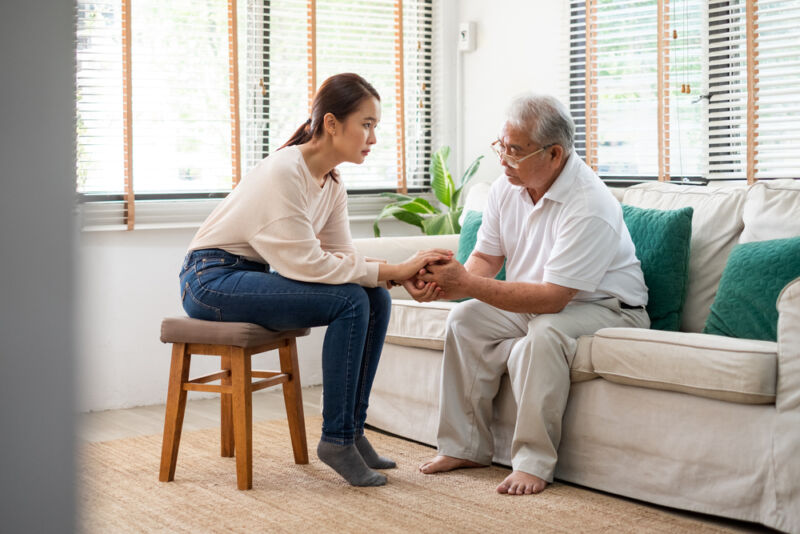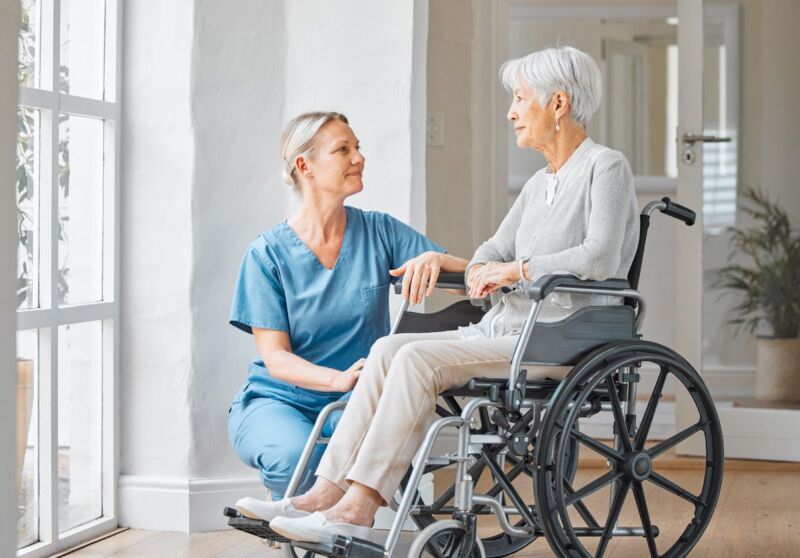Caring for a loved one in hospice is a profound act of love and dedication, but it also comes with emotional and physical challenges. As a caregiver, you may feel overwhelmed, exhausted, or even alone in this journey. However, support is available to help you navigate this difficult time. Whether through hospice professionals, support groups, or self-care strategies, there are ways to ease the burden and find comfort in knowing that you are not alone.

The Emotional and Physical Toll of Being a Caregiver
Hospice caregivers take on immense responsibilities, balancing medical care, emotional support and personal sacrifices. It is common for caregivers to experience both physical exhaustion and emotional strain. Understanding the challenges involved can help caregivers prepare for the journey ahead and seek support when needed.
Caregivers play a vital role in ensuring their loved ones are comfortable and well-cared for. However, this responsibility can take an emotional and physical toll. The constant need for care, the weight of making medical decisions and the emotional strain of seeing a loved one in decline can be overwhelming. Many caregivers experience burnout, anxiety and sadness, which can impact their own well-being.
Why Acknowledging Your Feelings is Important
Suppressing emotions or neglecting your own well-being can lead to caregiver fatigue. It is important to acknowledge feelings of sadness, frustration, or guilt and to seek support when needed. Talking to friends, family, or professionals can help process these emotions and provide reassurance that you are not alone in your struggles.

Hospice Help for Caregivers: Resources to Lighten the Load
Many caregivers feel they must shoulder all responsibilities alone, but hospice care services exist to provide relief and guidance. There are various forms of assistance available, including professional hospice teams, community resources and support organizations that cater specifically to caregivers.
The Role of a Hospice Team in Supporting You
Hospice care is not just for patients—it is designed to support caregivers as well. Hospice professionals, including nurses, social workers and chaplains, offer guidance, respite care and emotional support. They can assist with pain management, medical equipment and counseling, helping to ease some of the stress on caregivers.
If you need assistance navigating hospice care, consider reaching out to Three Oaks Hospice to explore available support options.
Finding Practical Help in Your Community
Caregivers have access to a variety of support systems, including professional hospice teams, local caregiver support groups and national organizations. While organizations such as the National Hospice and Palliative Care Organization (NHPCO) provide additional caregiver resources, Three Oaks Hospice is here to guide and support you every step of the way. From skilled nursing care to respite services, we ensure that both patients and caregivers receive the care and assistance they need.
If you’d like to learn more about how Three Oaks Hospice can support you, visit our hospice caregiver support page.
Taking Care of Yourself as a Caregiver
While caregiving often feels all-consuming, caregivers must also focus on their own health and well-being. Neglecting personal needs can lead to burnout and exhaustion, making it even harder to provide quality care to a loved one.
Setting Boundaries Without Guilt
Caregivers often feel pressured to do everything themselves, but setting boundaries is essential for their well-being. It is okay to ask for help, delegate responsibilities and take time for yourself. Establishing realistic expectations and accepting assistance from family, friends, or hospice professionals can make caregiving more manageable.
How to Prioritize Your Own Well-Being
Self-care is crucial for caregivers. Simple acts like getting enough sleep, eating nutritious meals and taking short breaks can make a significant difference. Engaging in stress-relieving activities, such as meditation, journaling, or light exercise, can help maintain emotional resilience during this demanding time.
Strength in Community: Connecting with Others Who Understand
The journey of caregiving can feel isolating, but there is strength in the community. Finding connections with other caregivers can provide reassurance, practical advice and emotional support.
The Power of Support Groups
One of the most valuable resources for caregivers is connecting with others who share similar experiences. Support groups, whether in-person or online, provide a safe space to share feelings, seek advice and receive encouragement. Organizations like Three Oaks Hospice can help caregivers find the right group to meet their needs.
Personal Stories of Caregivers
Hearing from others who have walked the same path can be incredibly comforting. Stories from caregivers who have found strength, resilience and community can serve as a reminder that support is available and that no one has to go through this journey alone.
You Are Not Alone—Hospice Help for Caregivers is Always Available
Caregiving is a journey filled with love, challenges and profound moments. Remember that you do not have to face it alone. Whether through professional hospice support, community resources, or the encouragement of other caregivers, help is available. Take the steps needed to care for yourself, seek support and find comfort in knowing that you are not alone in this journey. For more information or to speak with a hospice care professional, visit Three Oaks Hospice.







